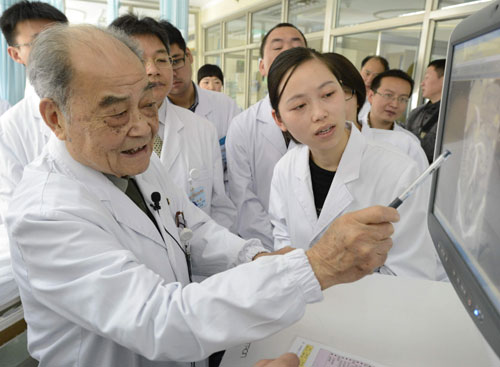A dedicated doctor carries on life's work
|
Li Jieshou, 89, discusses a clinical case with young colleagues at Nanjing General Hospital of Nanjing Military Region. Provided to China Daily |
At the age of 89, Li Jieshou still insists on showing up at the hospital's clinic every week to see patients.
He is not as energetic as he was 19 years ago, when he performed the first small bowel transplant surgery in Asia in 1994.
But he is still just as popular among patients and devoted to his work.
The 89-year-old doctor is the last hope for many of his patients. Most of them suffer from severe intestinal fistula, or pancreatitis.
"I do not hold the scalpel now, and I'm trying to pass on all my knowledge and experience to my students," Li says. "But I am still able to give suggestions, because I have more experience."
Li now serves as the vice-president of Nanjing General Hospital of Nanjing Military Region and visits professors in different medical universities. Still doing the rounds and providing medical consultation in complicated clinical cases, Li is regarded as a legendary figure in the surgical field.
Li was born in Hunan province in 1924 and was raised in a family of three sons with his older brother Li Ao and younger brother Li Leishi. Li Jieshou went to a medical school in Changsha, Hunan prvince, in 1943 with his younger brother Li Leishi, as their older brother was already a teacher there.
Of the three brothers, Li is the only one still alive today, his two siblings also made considerable achievements in the medical field.
Medicine was not Li's first choice when entering university.
"I followed my big brother to medical school because medical school did not charge for tuition and provided my accommodation, which was a big relief for my family at that time," he says.
That was during the 1940s, when China's political situation was volatile and the country was suffering under the Japanese invasion.
But Li's hard work and ingenuity earned him great success through five years of medical school. Together with his younger brother, Li was assigned to the surgical department of a hospital in Nanjing.
His early working years coincided with the founding of New China, as well as the Korean War, where he worked as a doctor with the army on the front line.
It was also during the war that Li witnessed devastating scenes of death and survival. He resolved to devote his whole life to the medical field.
An incident in 1990 made Li focus his research on bowel transplants. A 13-year-old girl was sent to the hospital's emergency rooms one night with abdominal bleeding. Her bowel was in two separate parts and a bowel transplant was the only way to save her life. But this had never been done in China, nor did anyone know how to do it.
The girl died in front of Li, as there was nothing he could do to save her.
Li was in tears, and from then on, he started to do trials and research on pigs. He says he often lived in the pigsty in order to better observe the animals.
The first bowel transplant surgery on a human was successfully conducted by Li in 1994. Since then, about half of the bowel transplants in Asia have been performed in Li's hospital.
Li last performed surgery in 2008 at the age of 85. The surgery went for six hours. After stepping down from the surgery table, Li fainted.
Since then, Li followed his students' advice not to perform surgery. But he often stays in the operating room during challenging enterochirurgia surgeries to provide help or advice.
"This is how I feel my life and knowledge is passed on, and can make a contribution to the future," he says.



















